Review of Gladiator (2 Disc Set)
Introduction
Although it features more intense brooding than your average blood-guts-‘n-testosterone epic, ‘Gladiator’ feels in turns tedious, tired, involving, sluggish, powerful, plodding, stilted and listless. The kind of film that wears itself out simply with the idea of having to generate spectacle. Director Ridley Scott (never the greatest action director, never more obvious than now) can’t decide whether he’s remaking the muddy revenge fervour of ‘Braveheart’, the existential combat terror and technical bravura of ‘Saving Private Ryan’ or whether he’s back on the set of the miserable ‘GI Jane’. Granted, the gladiatorial combat scenes have a certain lacerating brutality, although Scott severely overdoes the MTV fast-cut freneticism, he manages a certain disorientating feeling of bloody mayhem. Even though the violence quotient has been significantly clipped, a movie which features no less than half a dozen decidedly messy decapitations has to be worth something, even if it is just a place in the ‘Fangoria’ hall of fame.

Video
Now here’s a shock. Brace yourselves now. Are you sitting comfortably? Take a deep breath… ‘Gladiator’ looks great… there, weren’t expecting that were you? Although the idea of shrinking a Hollywood spectacle down to size is inherently crippling, its never made a great deal of difference to modern day blockbusters, where even an eye-ball is shot to look like the titanic. The sense of scale is thrown off in ‘Gladiator’ even more because of the blatantly artificial CG-landscapes. The effects look moderately less fake than on the big screen, mainly because now Oliver Reed’s tan really is as spectacular as a computer generated Coliseum. And that is a strange enough sight to be worth seeing.

Audio
Hooray! Hazzah! Wahoo! If there’s any ecstatic declarations I’ve left out, I apologise but DTS has finally arrived on region 2. And ‘Gladiator’ proves to be a most impressive curtain raiser for the dynamic sound system (if you have the capable hardware, but the 5.1 is excellent as well.) Hans Zimmer’s score (notice the bizarre similarities to the more contemplative moments of ‘MI:2’, which Zimmer also scored) booms and ripples, the action scenes have a sweaty, claustrophobic sonic clamour. Great. Basically.
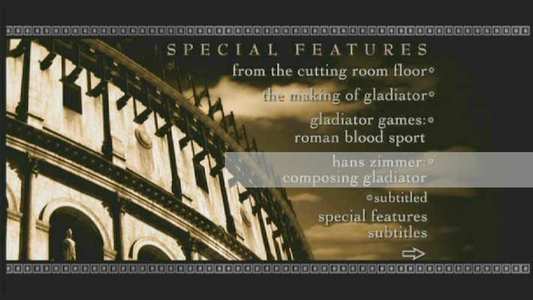
Features
Firstly, there’s a standardised Making of Documentary which outlines the central attractions of the movie and the movements of the narrative. Much back-slapping occurs, but its not uninteresting in following the rapid-fire, globe-hoping production. A 25 minute documentary investigating the rigorous development of Zimmer’s score is just as conventional, but more in depth. Zimmer admitting that most of his original ideas for scoring his movies are, frankly, s***. A 50 minute documentary takes a more factually and historically accurate look at the life and times of gladiatorial combat in the Roman Empire. The fatuous insistence on relating the Roman obsession with blood-sport to our own brutal sporting endeavours grows tedious after a while, as does the occasional repetition. Its entertaining enough, even if it does ultimately add up to nothing more than a soulless marketing ploy for the movie. Hypocritically, Ridley Scott makes it more than obvious how liberally historical fact is p***ed into the wind for dramatic effect in his commentary. He’s joined by editor Pietro Scalia and Cinematographer John Mathieson who basically sit there and remind Scott how great he is. It sheds some light on the movies more stupid and contrived moments, but sheds little light on the lumbering, technicality obsessed narrative. The collected deleted scenes in ‘from the cutting room floor’ are impressive, including some powerful material where Maximus witnesses the brutal execution of innocent Christians in the Colliseum. A grisly field hospital tour after the opening battle with Germanic barbarians; even more boring political exposition; plus two brilliant cut scenes featuring more of the loopy antics of Joaquin Phoenix’s Emperor Commodus: a fit of rage as he mutilates a statue of his father, an intense scene where Commodus orders the execution of two of his own Praetorian guard, complete with archery firing squad. There is a mighty collection of storyboards, including some great outlines of scenes that were not meant to be: including a potentially breathtaking rhinoceros battle (replaced with much less spectacular tiger-duel in the movie). If you’ve got a substantial constitution for sitting and reading text from your TV, the on-set journal from the young scroat who played Lucius might be of interest. Add to this a more than ample collection of trailers, TV Spots, stills gallery, production and cast/crew notes. A formidable package indeed.
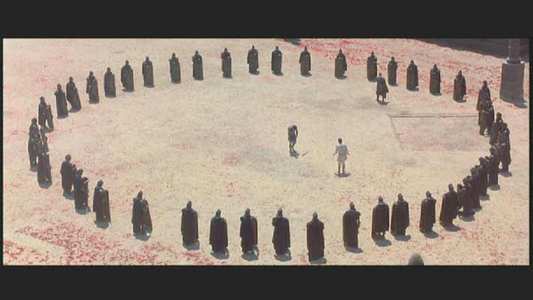
Conclusion
General Maximus (Russell Crowe) triumphantly defeats a bunch of unwashed barbarians on the muddy battlefields of Germania. Dying Emperor Marcus Aurelius implores surrogate son Maximus to take over his legacy and become Emperor, in the place of his wickedly devious son Commodus. Maximus, reluctant to leave his beloved family, and carrying some added baggage from an old fling with the Emperor’s daughter (Connie Nielsen) is reluctant to accept such a calling. Fortunately, Commodus spares him the trouble of deciding and dispatches his treacherous pop and orders Maximus and his idyllic wife and kiddie to be slaughtered. Maximus escapes his death sentence but his family aren’t so lucky. Finding himself lost in a depressive haze, and at the bottom of the brutal Roman social order, Maximus must fight his way from the ranks of a lowly slave to that of a mighty gladiator in order to face his destiny and take his revenge on Commodus.
Whenever ‘Gladiator’ stops fighting and starts talking it becomes a butt-scratcher of quite remarkable tedium. After the generic opening slaughter-house, the movie shifts back into first gear in order to perform the rudimentary ‘Act One: Set-up’ featuring dying emperors, statuesque ex-lovers, corrupt senators and family crucifixions. This proceeds for an interminable amount of time, the main problem being that the audience has already figured out the ending before Scott has even started. The trouble with ‘Gladiator’ is that its simply not content with being a stupid, soulless buster of blocks like say ‘The Mummy’ or ‘The Matrix’, its only real passion is for becoming the kind of old-school epic that Hollywood simply does not make anymore (and, if this is the result, for good reason.) The problem arises however, that whenever ‘Gladiator’ stops hacking off limbs and tries to grow a brain (and a political conscience, no less!) it becomes a mannered, half-baked and unsatisfying. Scott’s insistence on increasingly operatic pretence towards the climax does him more harm that good, promising an emotional punch the material is not capable of bestowing.
That said, Oliver Reed delivers a fine last performance as honourable but opportunistic Slave-trader Proximo and Richard Harris is decayed, aching and quietly passionate in a film starkly lacking in any. Crowe, an intense actor who doesn’t tend to bother himself with the petty internalised insolences of the method (i.e., the anti-method actors edict: remember your lines and try not to bump into the scenery). As a movie star, Crowe’s performance is strained and lifeless, at times, Crowe resembles little more than the statues that proliferate the Coliseum: bulbous, proud and made of stone. Djimoun Hounson (Cinque from Spielberg’s ‘Amistad’) plays a fellow Gladiator and Crowe’s partner-in-slavery, and as a result is in serious danger of being typecast. He’s also the only black member of the cast, except, lest we forget, a black female archer who, naturally, Scott has chopped in half. Joaquin Phoenix however, is the biggest misstep, delivering a performance that veers drastically from high camp to maudlin sincerity to the simply embarrassing realisation that he is way out of his league. There’s a potty feeling of canned ham to some of his latter scenes, and he does deliver some classically awful dialogue with self-parodying gusto: “I have been terribly vexed.” Throw into this a decidedly smutty oh-so-Caligula incestuous desire for his sister Lucilla, (Nielsen, beautiful and beautifully flat) and you have the lamest piece of hammy villainy since Billy Zane camped out in ‘Titanic’, only less fun.
The special effects team were clearly working overtime, delivering stunningly bland computer generated vistas: the sprawling kingdom of Rome complete with thousands of CG people; decadent Palaces so misty with incense you begin to think that Scott has replaced his love of phallic imagery with something more in keeping with brother Tony’s obsession with filling every room with enough smoke to asphyxiate a large elephant; massive Germanic battlefields that look worryingly like middle-England, and the impossible grandeur of the Roman Coliseum itself, complete with thousands of cheering and, mostly CG, spectators. There’s no real spectacle so to speak, just the rather depressing realisation that a lot of time, talent and money was spent leering over a computer screen to come up with the most shiny fake imaginable. Yes, the spectacle we’re all supposed to revel in and get so excited about is precisely the result from a lot of wasted patience. ‘Gladiator’ doesn’t simply fail to live up to the hype, it feels graciously unworthy of any kind of hyperbole. In every sense, the film is starkly unremarkable. Want a sound-bite? How’s: ‘Up Pompeii’, without the laughs, from the bloke who made ‘GI Jane’. There, so much for the hype machine.
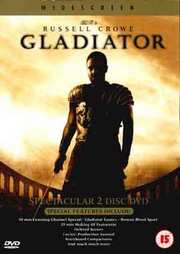
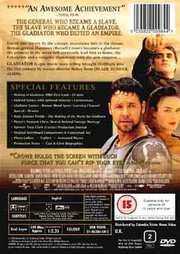














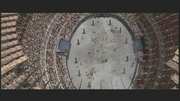

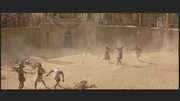










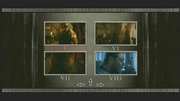

































Your Opinions and Comments
Be the first to post a comment!